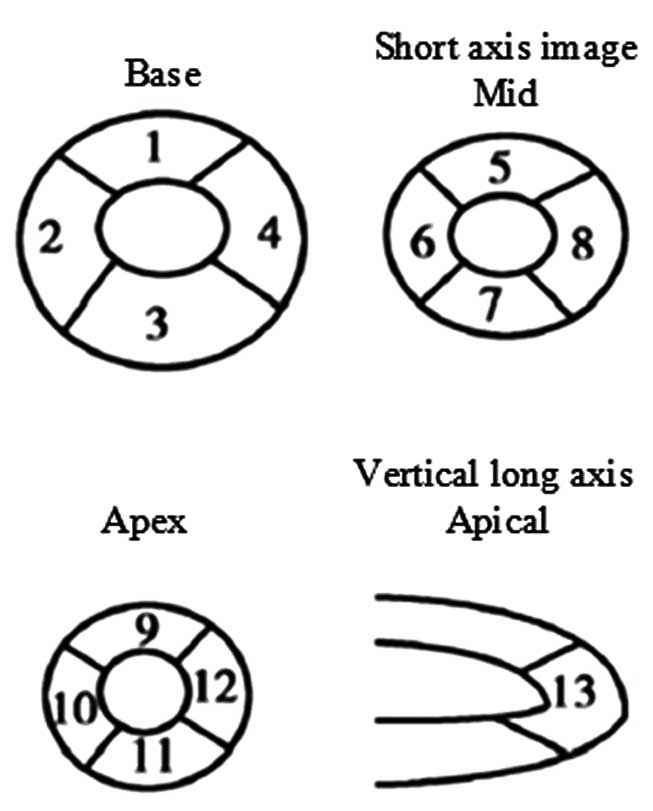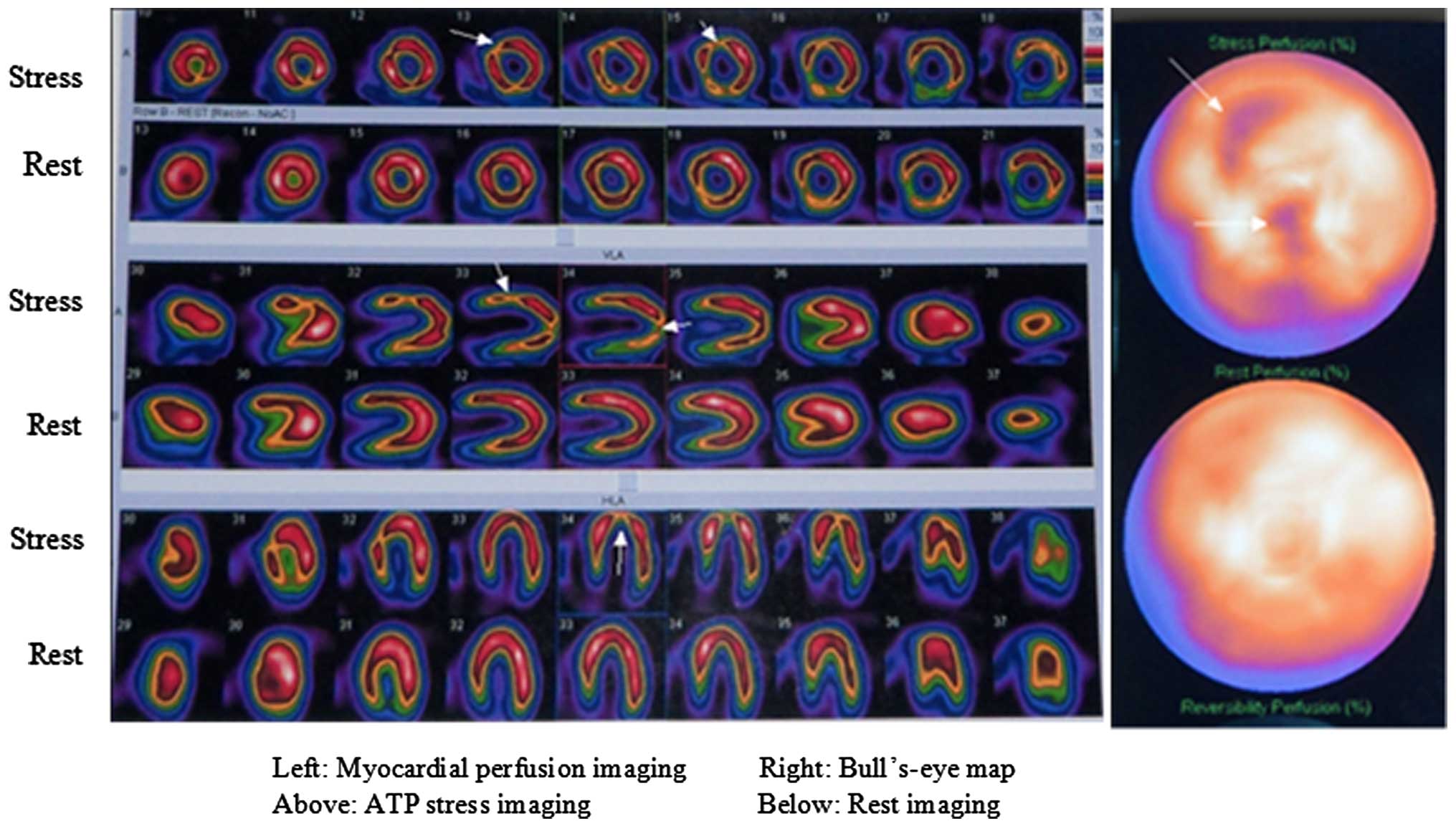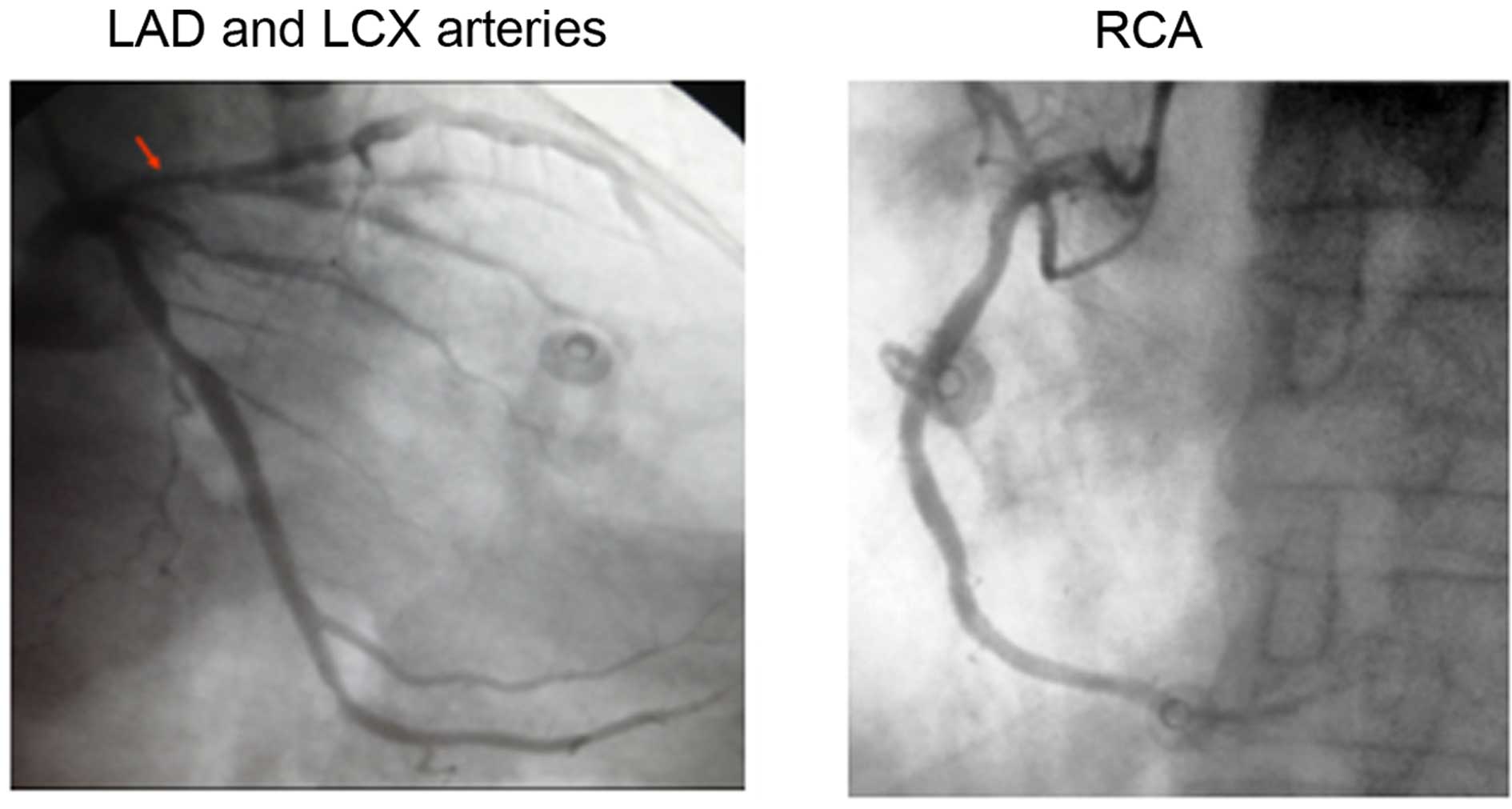|
1
|
Mercado N, Boersma E, Wijns W, Gersh BJ,
Morillo CA, de Valk V, van Es GA, Grobbee DE and Serruys PW:
Clinical and quantitative coronary angiographic predictors of
coronary restenosis: A comparative analysis from the
balloon-to-stent era. J Am Coll Cardiol. 38:645–652. 2001.
View Article : Google Scholar : PubMed/NCBI
|
|
2
|
Albertal M, Abizaid A, Munoz JS, Mintz GS,
Abizaid AS and Feres F: A novel mechanism explaining early lumen
loss following balloon angioplasly for the treatment of in-stent
restenosis. Am J Cardiol. 95:751–755. 2005. View Article : Google Scholar : PubMed/NCBI
|
|
3
|
Singh M, Gersh BJ, MeClelland RL, Ho KK,
Willerson JT and Penny WF: Clinical and angiographic predictors of
restenosis after percutaneous coronary intervention. Circulation.
109:2727–2731. 2004. View Article : Google Scholar : PubMed/NCBI
|
|
4
|
Veselka J, Cadova P, Tomasov P, Theodor A
and Zemanek D: Dual-source CT angiography for detection and
quantification of in-stent restenosis in the left main coronary
artery: comparison with intracoronary ultrasound and coronary
angiography. J Invasive Cardiol. 23:460–464. 2011.PubMed/NCBI
|
|
5
|
Dowsley T, Al-Mallah M, Ananthasubramaniam
K, Dwivedi G, McArdle B and Chow BJ: The role of noninvasive
imaging in coronary artery disease detection, prognosis, and
clinical decision making. Can J Cardiol. 29:285–296. 2013.
View Article : Google Scholar : PubMed/NCBI
|
|
6
|
Uebleis C, Hellweger S, Laubender RP,
Becker A, Sohn HY, Lehner S, Haug A, Bartenstein P, Cumming P, Van
Kriekinge SD, et al: Left ventricular dyssynchrony assessed by
gated SPECT phase analysis is an independent predictor of death in
patients with advanced coronary artery disease and reduced left
ventricular function not undergoing cardiac resynchronization
therapy. Eur J Nucl Med Mol Imaging. 39:1561–1569. 2012. View Article : Google Scholar : PubMed/NCBI
|
|
7
|
Akalin EN, Yaylali O, Kıraç FS, Yüksel D
and Kılıç M: The role of myocardial perfusion gated SPECT study in
women with coronary artery disease: A correlative study. Mol
Imaging Radionucl Ther. 21:69–74. 2012. View Article : Google Scholar : PubMed/NCBI
|
|
8
|
Shaw LJ, Hendel R, Borges-Neto S, Lauer
MS, Alazraki N, Burnette J, Krawczynska E, Cerqueira M and Maddahi
J: Myoview Multicenter Registry: Prognostic value of normal
exercise and adenosine triphosphate (99m) Tc-tetrofosmin-SPECT
imaging: Results from the multicenter registry of 4,728 patients. J
Nucl Med. 44:134–139. 2003.PubMed/NCBI
|
|
9
|
Wang LJ, Li XJ, Sun YX, Li N and Li YM:
The clinical value of adenosine stress 99mTc-MIBI gated
myocardial perfusion imaging in diagnosis of coronary artery
disease. Zhong Guo Xun Huan Za Zhi. 26:170–173. 2011.(In
Chinese).
|
|
10
|
Karpova IE, Samoĭlenko LE, Soboleva GN,
Sergienko VB, Karpov IuA, Chernysheva IE and Ioseliani DG:
Adenosine triphosphate stress (99m)Tc-MIBI single-photon emission
computed tomography in the diagnosis Miocardial Iscemia in patients
with Microvascular Angina. Kardiologiia. 54:4–8. 2014.(In Russian).
View Article : Google Scholar : PubMed/NCBI
|
|
11
|
Milavetz JJ, Miller TD, Hodge DO, Holmes
DR and Gibbons RJ: Accuracy of single-photon emission computed
tomography myocardial perfusion imaging in patients with stents in
native coronary arteries. Am J Cardiol. 82:857–861. 1998.
View Article : Google Scholar : PubMed/NCBI
|
|
12
|
Xu ZN, Li DF, Li JH, Feng JL and Cheng X:
The value of gated myocardial perfusion imaging for evaluating
stent restenosis after percutaneous coronary interventions. Lin
Chuang Xin Xue Guan Bing Za Zhi. 25:302–305. 2009.(In Chinese).
|
|
13
|
Coroleu SF, De Vita M, Burzotta F, Trani
C, Porto I, Niccoli G, Leone AM, Tommasino A, Talarico GP,
Schiavoni G and Crea F: Angiographic and clinical outcome of
percutaneous coronary intervention for in-stent restenosis of
bifurcated lesions. EuroIntervention. 8:701–707. 2012. View Article : Google Scholar : PubMed/NCBI
|
|
14
|
Buchler RD, Ribeiro EE, Ade P Mansur,
Smanio P, Meneghelo RS, Chalela WA, Buchpiguel CA, Buchler JR,
Bates ER and Martinez EE: Noninvasive assessment of patients
undergoing percutaneous intervention in myocardial infarction. Arq
Bras Cardiol. 95:555–562. 2010.(In English, Portuguese). View Article : Google Scholar : PubMed/NCBI
|
|
15
|
Ohtaki Y, Chikamori T, Hida S, Tanaka H,
Igarashi Y, Hatano T, Usui Y, Miyagi M and Yamashina A: Clinical
characteristics in patients showing ischemic electrocardiographic
changes during adenosine triphosphate loading single-photon
emission computed tomography. J Cardiol. 55:370–376. 2010.
View Article : Google Scholar : PubMed/NCBI
|
|
16
|
Conti A, Mariannini Y, Canuti E, Petrova
T, Innocenti F, Zanobetti M, Gallini C and Costanzo E: Nuclear scan
strategy and outcomes in chest pain patients value of stress
testing with dipyridamole or adenosine. World J Nucl Med.
13:94–101. 2014. View Article : Google Scholar : PubMed/NCBI
|
|
17
|
Chen GB, Wu H, He XJ, Huang JX, Yu D, Xu
WY and Yu H: Adenosine stress thallium-201 myocardial perfusion
imaging for detecting coronary artery disease at an early stage. J
Xray Sci Technol. 21:317–322. 2013.PubMed/NCBI
|
|
18
|
Galassi AR, Foti R, Azzarelli S, Coco G,
Condorelli G, Russo G, Musumeci S, Tamburino C and Giuffrida G:
Usefulness of exercise tomographic myocardial perfusion imaging for
detection of restenosis after coronary stent implantation. Am J
Cardiol. 85:1362–1364. 2000. View Article : Google Scholar : PubMed/NCBI
|
|
19
|
Kósa I, Blasini R, Schneider-Eicke J,
Neumann FJ, Matsunari I, Neverve J, Schömig A and Schwaiger M:
Myocardial perfusion scintigraphy to evaluate patients after
coronary stent implantation. J Nucl Med. 39:1307–1311.
1998.PubMed/NCBI
|
|
20
|
Elhendy A, Schinkel AF, van Domberg RT,
Bax JJ, Valkema R and Poldermans D: Non-invasive diagnosis of in
stent stenosis by stress 99m technetium tetrofosmin myocardial
perfusion imaging. Int J Cardiovasc Imaging. 22:657–662. 2006.
View Article : Google Scholar : PubMed/NCBI
|
|
21
|
Wei HY and Shi RF: The clinical value of
SPECT 99mTc-MIBI ST/RE myocardial imagings in restenosis
after percutaneous coronary angioplasty. Zhong Guo Xin Xue Guan Za
Zhi. 9:199–201. 2004.(In Chinese).
|
|
22
|
AlJaroudi WA, Alraies MC, Cerquiera MD and
Jaber WA: Safety and tolerability of regadenoson in 514 SPECT MPI
patients with and without coronary artery disease and submaximal
exercise heart rate response. Eur J Nucl Med Mol Imaging.
40:341–348. 2013. View Article : Google Scholar : PubMed/NCBI
|
|
23
|
Karamitsos TD, Arnold JR, Pegg TJ, Cheng
AS, van Gaal WJ, Francis JM, Banning AP, Neubauer S and
Selvanayagam JB: Tolerance and safety of adenosine stress perfusion
cardiovascular magnetic resonance imaging in patients with severe
coronary artery disease. Int J Cardiovasc Imaging. 25:277–283.
2009. View Article : Google Scholar : PubMed/NCBI
|

















